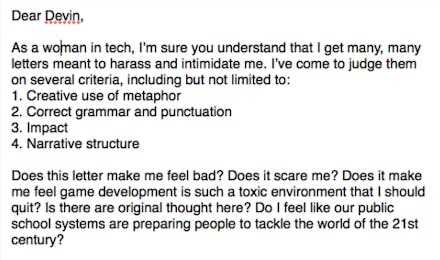Woman Turns the Tables on Misogynistic Troll in the Best Way Possible

The increased presence of women in tech, from gaming to coding and programming, appears linked to a corresponding rise in their harassment, especially in virtual domains.
Women make up twice as many gamers as teenage boys, but on social media and on their preferred gaming platforms, they've become targets of violent threats.
Brianna Wu, head of development at Giant Spacekat and host of the Isometric podcast on 5by5, has faced incessant harassment online. An outspoken critic of the trolling, Wu recently took to Twitter to prove that there's more than one way to fight a troll. Wu's sarcastic yet pointed response to one male gamer tells him to be more original and wittyif he wants her to take him seriously.
This is Wu's way of coping with a very serious problem, but that doesn't mean targets of this harassment should feel the need to respond to or even joke about it. There is no "right way" to handle this kind of vitriol. In this case, Wu's response comes on the heels of more malicious abuse that she has encountered in recent months, from shocking emails ("Women are the niggers of gender," one email read. "If you killed yourself, I wouldn't even fuck the corpse.") to threatening text messages revealing the sender's knowledge of Wu's home address.
The misogyny is so pervasive that Wu compiled a collection of stories and published them in multiple parts as "Letters to Women in the Games Industry."
She's far from alone. Feminist video game critic Anita Sarkeesian has received so many threats in recent weeks in response to her latest web series, Feminist Frequency's Tropes vs. Women, that she was temporarily driven from her home.
Harassment is pervasive in large part thanks to the anonymity of the harassers. Like women gamers, the ladies at Jezebel know this all too well, and they, like their gaming sisters, know that authority figures, from the gaming industry to social tech/media platform giants like Twitter and YouTube, do little to nothing about it. Samantha Allen at the Daily Dot has written about this abuse, its perpetuation and ramifications, as experienced by the female content creators:
"[W]e live in a world where women can't even speak without being harassed... [T]he Internet has also made it much easier for men to manipulate, harass, abuse, stalk and, yes, physically harm women. ...[It] provides them with easier and more public ways to display their terribleness at the expense of women's health and wellbeing. Worse, it creates new places... in which men can reinforce and encourage each other's sexist behavior."
This behavior has been well-documented. According to ThinkProgress, "[c]omplaints of anti-woman policies have plagued the heavily male tech industry. Tech and gaming circles have struggled to shed their reputations as boys' clubs that shut out and abuse women and minorities. Even former GitHub web developer Julie Ann Horvath, who worked to recruit more women into tech, quit her job due to online and in-person harassment from coworkers."
Wu, Sarkeesian, Allen and a host of other women in tech have had enough. The question is whether the industry will listen to their voices — which may only happen when the industry realizes that women's voices are crucial to their bottom line.